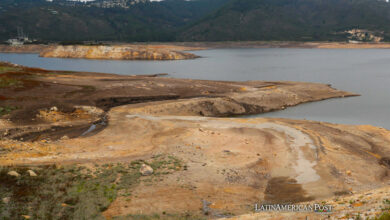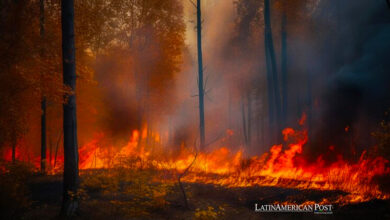Scientific Rebellion: Why Are Academics Protesting?
From April 04 to 09, thousands of scientists from more than 27 countries have joined in protest, under the leadership of the “Scientific Rebellion” movement. This is a call to States and companies not to continue ignoring climate change .

Photo: TW-ScientistRebel1
LatinAmerican Post | María Fernanda Ramírez Ramos
Listen to this article
Leer en español: Rebelión Científica ¿Por qué están protestando los académicos?
The international movement Scientific Rebellion ( Scientist Rebellion ) has called on the academic communities of the world to join a series of protests and mobilizations of non-violent civil disobedience, to demand that governments take urgent action against the climate crisis.
The week was strategically chosen to coincide with the release of the United Nations IPCC report on climate change mitigation. In this regard, scientists are acting under the motto: "1.5° is death, climate revolution now!"
In this way, more scientists from all over the world have expressed their support through social networks and have organized acts of protest, within the framework of non-violence, to draw attention to the need to take urgent measures to mitigate and prevent the consequences of climate change.
One of the most notorious acts was the one carried out by scientists in Spain, spilling false blood on the National Congress. On the other hand, in Los Angeles several scientists were arrested for protesting against the Chase bank for its financing of fossil fuels. In the Netherlands, a group of scientists blocked the entrance to the Ministry of Economic Affairs and Climate Policy in The Hague to demand emergency action.
What are scientists asking for in Latin America?
One of the most problematic issues of the environmental crisis is the deepening of inequality due to the way it is and is going to affect the different regions of the world. The investigations agree that the countries of the global south will be the most affected, while those of the north produce the majority of the contamination. In addition, groups such as indigenous people and women are more vulnerable. Therefore, we speak of climate justice.
In this sense, scientists from the south of the American continent have spoken out in favor of this climate justice and against the indiscriminate exploitation of natural resources in the region. In addition, they speak of the need for decolonial approaches to environmental problems in Latin America.
We recommend you read: 99% of Humanity Breathes Polluted Air
In this regard, in Panama, scientists protested at the embassies of the United Kingdom, Germany and the United States calling for an end to the exploitation of fossil fuels and requesting financial support for the energy transition in the global south. Also, high school students came together to hold climate marches to support teachers.
Several academics met at the Ministry of the Environment in Ecuador to ask for an end to corruption, hypocrisy and inconsistency in environmental policies, for example, those related to oil exploitation.
El día de ayer en alrededor de 25 países en el mundo la comunidad científica se declaró en Rebelión. #scientistrebellion En Ecuador también nos unimos al grito de emergencia mundial. Somos Rebelión Científica Ecuador ????????. @ScientistRebel1 ????1/3 pic.twitter.com/qzkknlAVi4
— Jordan Andres Cruz (@jordanandrescr) April 7, 2022
"Lectures, teaching, outreach and educational disobedience were carried out in countries such as Argentina, Colombia and Nigeria involving hundreds of scientists and students on the impact of climate collapse in the Global South and the need to decolonize activism," the statement said. official of the Scientist Rebellion movement. The truth is that in practically all countries, such as Chile, Mexico, Brazil, Peru or Bolivia, there are more and more voices of academics who unite in support of this call for global attention.
Dr. Rose Abramoff, a climate change scientist, noted that “As scientists, we tend to be risk-averse. We don't want to risk our jobs, our reputations, and our time. But it is no longer enough to do our research and hope that others read our publications and understand the seriousness and urgency of the climate crisis.(…) Let's make this crisis impossible to ignore”.
With these words from the leader of the movement, it is possible to feel like you're living in the successful Netflix movie “Don't Look Up”. A group of scientists warns about a global catastrophe, but the world ignores them, especially companies and politicians, ignore them. Can reality surpass fiction? How will this Scientific Rebellion end? These are unknowns that still remain unsolved.





